SH: Those area great initiatives Hal.
Hal: We felt good about it. We thought we were fighting the good fight.
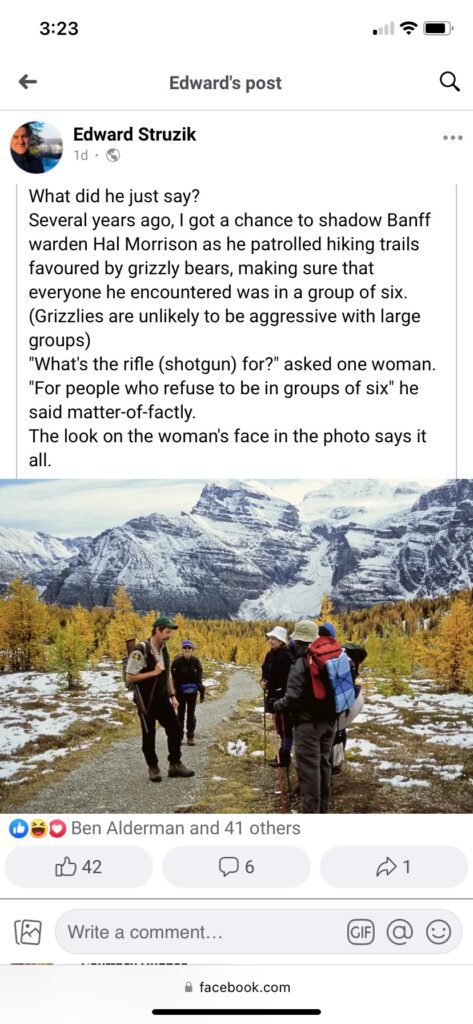
SH: Anything else you’d like to mention about that phase of your career. (Tape Section 2: 12:01)
Hal: The tolerance and adaptability of grizzly bears … we learned a lot. We were a little bit hard on our bears in years, you know 60s, 70s and 80s. We didn’t give them much of a chance. We learned a lot of things as we started to try and reduce morts especially grizzly bear mortalities. We found out, the bears were teaching us, that they were quite able and willing, -some grizzly bears-, especially sows with cubs, to live hard along some facilities, like Lake Louise townsite, and Lake Louise campground. It was up to us to be able to get a sufficient level of comfort public safety wise and figure out how to allow them to use those key habitats in a safe manner. It was difficult to get buy in with this idea to some managers, and some wardens, that we were going to tolerate grizzly bears living closer to the townsite because people were thinking that it was going to be too high of a public safety risk. But we had the luxury of being able to know our collared bears quite well as well as some uncollared. We knew them and their temperament quite well, the human component less so. We were able to allow them to utilize some of those key habitats, it was just how we were going to do it safely, and the electric fence definitely was a big one in that capacity.
They were way more adaptable and tolerant than we thought. There was quite a bit of talk about well, they are going to become too habituated to people. Sorry, but that ship had already sailed in the main valleys. They were already habituated to people and honestly it was probably good in most cases. There Is some evidence habituated bears are less aggressive in many situations. Many of the grizzly bears that did work in and around the Lake Louise townsite or Field or in some of the campgrounds, they knew what people were all about and tried to avoid them or ignore them. Then the trick is to get people to behave.
Note: (Hal and I discussed Province bears versus National Park bears but I didn’t transcribe that)
SH: What did you like about being a Warden? What didn’t you like about being a Warden? (Tape 16:32)
Hal: All the training you received as a warden was incredible. It was a good thing for the comradery and formation of a team. You learned to trust each person, and when you are in a tough scrape or a rescue or dealing with a wildlife human conflict situation or a mauling, you knew you could depend on these people. The training was great and so varied.
Deep powder skiing, how can you beat that kind of training. Whitewater canoeing, boating, climbing, mountain travel, ocean travel, it was all incredible. The horse work … that was a big plus. It became difficult to use horses in wildlife human conflict. It was just … one example would be, I liked using horses when I could up at Moraine Lake, but it became such a hassle to find a place to park the truck and the horse trailer and then by the time you got the horse out you were surrounded by tourists trying to take pictures. It took you an hour to get out of the parking lot, but finally you could head off. But it would chew up a whole day+, where if you wanted to do a quick patrol up to Paradise Valley or to Sentinel Pass or Larch Valley, you could hike up there and be back in half a day and still get some other things done too. In Yoho we had the opportunity to use horses more which was great.
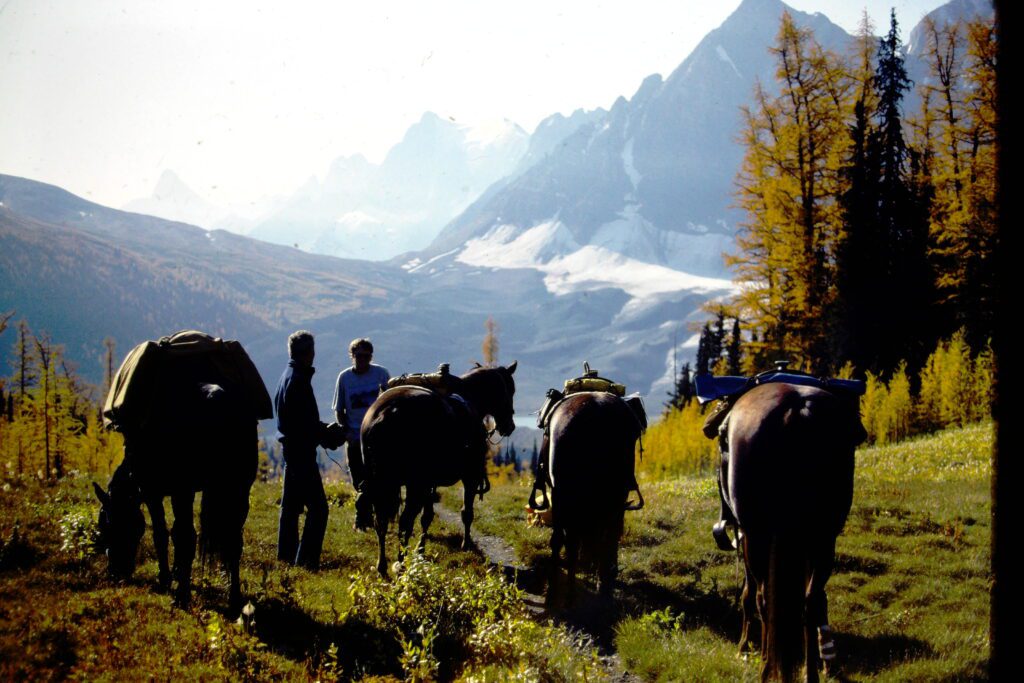
On patrol, Goodsir Pass area.
So, what did I like and not like about being a warden? Overall, I’d have to say it was a great ride. There were a few squalls to ride through and a couple of tough creek crossings, but overall, it was a great ride. The first twenty-eight or twenty-nine years, I have mostly fond memories of. The last three years or so, it was a difficult time. Parks had been going through a difficult time before that and the last three years, there wasn’t a lot of happiness. The Parks family was breaking down, and or being broke down. I was glad to retire. The last year, I was still working out of the Yoho office, that’s kind of where I had my office. The office really was my truck, but where I kept the paperwork and had a computer was in Yoho. The last year it was kind of weird going in there. It was like some sort of “invasion of the body snatchers” because there was nobody else in there. Ken Schroeder and Will Devlin, they were the last two. There used to be the three of us in there. They had taken the buyout. When I first started in that office there were eight or nine wardens, there were six or seven interpreters and three or four other people in there. It was a thriving office and for the last year it was kind of like walking into the twilight zone, like somebody forgot to tell you that you should pack up and move out too.
SH: Wow, that’s different.
Hal: Yes it was quite different. What didn’t I like about being a warden? The campground cowboy was not my favorite chore and the amount of highway wrecks that I used to have to go to, that wardens had to go to, in Yoho, the highway wrecks were not a great thing as well. It was quite a meat grinder and still is.
SH: Yes, especially when it wasn’t twinned through there. What are some of the more memorable events of your Warden Service career? (Tape Part 2: 21:22)
Hal: The whole thing, like I said…. Twenty-nine odd years of great memories. The one where it really sticks in my mind is when I got into trouble for telling the truth to the press. We all had spin doctor training and you had to get across your messages and tick all the boxes. At the time, this would have been around 2001, I was dealing with a young female grizzly number 56 in Lake Louise, and she had a young cub with her, and it just wasn’t going well. There was so much going on and we’d already had a couple of bears run over on the railway and the highway. I could tell this was going to come to a poor end. It was frustrating, because we were doing our best to try to keep her alive. A young even tempered habituated but not food conditioned female grizzly, we should have been able to pull out a lot of stops in an effort to keep her alive. At the time too, it was kind of odd, but in Lake Louise there was quite a lot of building activity. Up at Harry’s Hill there was a six plex going in, new building construction at the four two site on the way out to the campground. There were several brand new buildings going up, including more staff housing up at the Chateau. Cathy Ellis was interviewing me, and I was expressing my frustration on an off-camera moment, and she said “You know what, maybe we should write this down.” I said “Well you know, that’s kind of coloring outside the lines”. I went home and I talked to Janice about it, and I said “I think I’m about ready to express my frustrations, to tell it how it is to a newspaper. We’re trying to keep grizzly bears alive and yet there’s continued human outgrowth in a really tight, important area. You’ve got the TransCanada Highway, you’ve got the ski hill, you’ve got railway tracks, the 1A, you’ve got the Chateau. We’ve pretty much walled that valley up. I said I’m not sure how this is going to go. I could possibly end up being fired, I’m not sure, so what do you think about that, because we had three young kids. I was almost looking for an out. And she said “No, do what you gotta do.” So, I thought “Okay, she’s on board”.
So, I went to talk to Cathy Ellis and we had a good frank talk about what was going on, and what I was seeing, and the difficulties of trying to keep bears alive on that landscape. She wrote the story, and it was in the Crag and Canyon, but then the next day it got picked up by two big eastern papers. I think the Globe and Mail, and the National Post. It was on page two or something, pretty high profile. So immediately, the alarm bells were going off in Ottawa because the title wasn’t very good. It was like Parks Canada employee says Parks isn’t doing enough. So I got into hot water immediately … and they said we’ll figure out what we’re going to do with you but for now we don’t want you speaking to the press. So fair enough, it didn’t really hurt my feelings at all not having to speak to the press.
But about a month or two later there was another big issue brewing with another bear and by then number 56 had been struck and killed by a train. So, they wanted me to talk to the press again. I was reinstated in that way, and I wasn’t overjoyed, but they said something like “Okay, we want you to feel remorse for coloring outside the lines and telling that to the paper. We don’t want you to do that again but continue the spin.” But the good part was the Lake Louise Community Plan was almost ready to be signed off by Shelia Copps when the newspaper articles came out. So there was a bit of furor around that and then there was a quick revision to the Lake Louise community plan and the amount of beds, for staff housing and residences, as well as visitors and such, the amount of beds was reduced, so hopefully the newspaper thing did actually help out in that respect. Shelia Copps signed it off and I don’t even know if they have reached that outgrowth, they had it capped at, which was too much as we see now. Lake Louise had some real challenging parking issues, especially up at Moraine Lake, at the Lake itself, and in town and I’ve heard it’s gotten far worse since then.
SH: Yes, the staff accommodation at the Charleston burned down this summer.
Hal: Yes, the Charleston. Yes, it’s too bad that I felt almost forced into having to color outside the lines like that. It didn’t feel right. You’re not necessarily being a real team player when you’re doing that.
SH: Well hopefully that made a difference Hal.
Hal: I think it made a small difference, but like I said, even though it reduced the amount of beds, or I hope it influenced reducing the number of beds, I’m not even sure they’ve reached their cap, they set back in 2001. It’s too much.
SH: How did the Warden Service change over the years?
Hal: Like I said, I’ve got 28 or 29 years of great memories of the Warden Service. Overall, the national training that we used to receive was great, it accomplished quite a few things, we had a decent rapport with wardens right across Canada. I think there was 400-odd of us and we felt there was a pretty good team there. There was a lot of comradery and such. You could see the Warden Service was changing and was going to change further. Professional standards and specialization were on the march and had been for a while. It’s too bad it couldn’t have taken place in a slower more thoughtful, and considered fashion. I don’t really have much to say about that.
SH: What about the Warden Service was important to you? (Tape 31:40)
Hal: Probably what I was mentioning before. There was the Parks Canada family. We got along well with highways, with the interps, with trades. They were helping us and we were helping them. Being part of that, there were at least two or three social events a year in Yoho for example, where the whole park would get together. Then the Warden Service used to socialize and hung out now and again and have little functions ourselves, gymkhanas or whatever. That was pretty important, and it made for a good cohesive group.
SH: That’s a good answer.
SH: Are there any legends or stories associated with the Warden Service that you can share? Is there anyone in the Warden Service that stands out in your mind?
Hal: The whole idea of protecting and preserving the parks, back to what you were just talking about. We all kind of lived that dream and fighting the good fight. That was a big part of it, kind of idealism. We hadn’t had it tempered yet with other stuff that was coming down the pipe.
Legends…. I don’t really know any legends. We’re all legends in our own mind. Generally, good capable people you could rely on. Everybody was a legend. There were some really interesting characters. One of them, Mac Savoie in Cape Breton Highlands, an interesting character, and a capable warden. A World War 2 vet and he took his job as a Park Warden seriously. We were on a stakeout one night and looking over this big field near Corney Brook in the park and we had this deer decoy set out. You’re sitting around waiting in the dark for somebody to come shine a flashlight and shoot at the deer, so you got a bit of time on your hands. He started sharing a few stories from World War 2 because he was a vet, and he was in a tank. What that man had been through. He’d had some pretty tough times. It was fascinating to hear his stories other than being a warden. He was one of the friendliest, nicest guys. When we first arrived in Cape Breton, Janice and I and the kids, he said, I’ll run home in the Warden truck and I’ll pick up my car and we’ll load you and your family in, and I’ll tour you around, and introduce you to people, and show you this and that. Just a real, welcoming nice fellow and a good warden. Does that qualify as a legend?
SH: Sure, that’s a legend and it’s nice to hear about Eastern parks people. Is there anything about the Warden Service, as you knew it, that you would want future generations to know?
Hal: Pretty much whatever I’ve said so far.
SH: What made the Warden Service such a unique organization? (Tape 36:25)
Hal: It was kind of interesting that an independent bunch of individualists, could come together. Like you’d have a few people that were grumpy, expressing their opinion this way and that way, but they could come together when there was a job to do. By and large, wardens were an organization of independent individualists. Ha.
SH: You kind of had to be to do that work.
Hal: Oh ya.
SH: Okay Hal, I want some great stories, lasting memories, humourous stories?
Hal: I’ve got nothing but stories. Where do you want to start?
Nahanni Park was my favourite park. All the parks I had the good fortune to work in were great, but Nahanni, was truly on its own and you were truly on your own. You had to use your wits and have good skills and be able to develop a lot of skills. When you are up in the park you likely wouldn’t be able to call a helicopter or any help, you had to figure it out yourself whether you’re dealing with a grizzly bear who’s working Figure 8 portage, or you’ve got engine or pump troubles on the Jet Boat, or you’re up on a sandbar with a boat or whether there’s another concern. That was the challenge.
So, in Nahanni one year the idea was the park needed a bit more exposure, I forget whose idea this was. …. Superintendent. So, they got a number of different news agencies to send up a reporter and they were going to canoe down the Nahanni and get a chance to experience what a full adventure this was. So they wanted us to go up and babysit the canoers, who were coming down. They had black feather guides with them as well. Myself and Murray Heap were in the jet boat, and we were basically just babysitting them. There’s some pretty good rapids depending on the water level, one of them could be running at Class 4, so we were just babysitting them in the jet boat, making sure they made it through some of the bigger rapids. I think there was about 4 canoes coming down and two people in each and it was getting a little bit boring, watching them go down the rapids and then we’d run down, and watch them do the next set. So, we’re sitting there, and we turned off the jet boat, and we’re just drifting backwards with the 8-mph current. We had taken their food barrels so the canoes would be lighter running the rapids. Murray and I were remarking on how many food barrels they had and how heavy they were. Upon investigation we were amazed at the quantity of food, snacks and beverages. We decided that we had better have a snack and a beverage (dehydration is a constant concern). We’re enjoying our snack and bevy as we’re watching these guys go through the rapids and I noticed a sweeper coming up aways behind us. This sweeper was a bit odd; it had fallen pointed upstream and it was kind of spiky with broken branches and barkless and about 4 ft off the water surface.
So, I went to start the jet boat, and just move it a little bit more out into the current and shut it down again but I couldn’t get the jet boat started. We got a couple of sweeps/ long oars out and Murray was trying to move the ass end of the boat out a bit. We weren’t able to move the boat fast enough with oars and there wasn’t time to troubleshoot why the boat wouldn’t start. I ran to the back, and the jet boats are big boats, they’re 27-foot long boats, I ran to the back and grabbed the tip of the sweeper as we were coming on to it. I said to Murray, “I’m going to walk the sweeper towards you and you push it up over the windshield and we’ll get clear of this thing and then we can troubleshoot the engine.” As I’m walking it towards him, and this is happening kind of quick, because the current is moving us fast, and anyways, the sweeper hand off didn’t go so good, and now the sweeper is trapped under the windshield. It pushes the windshield frame, bends it, pushes against the windshield, the window pops out and we slide down this big spiky old sweeper inside the bent-up windshield frame. Now we’re looking like a damned shish-kabob. We’ve got this big sweeper sticking out where the windshield should be, kind of narwhal like, and here’s these reporters coming down with their guides and canoes, and they’re looking at us, like “Holy Christ, you guys are looking after us?” So ya, tuck their snacks and bevy’s away, and “Nothing to see here boys. You just keep on canoeing. We have a small issue to resolve here, and we’ll meet up down river in a bit.” So we had to work on how we were going to get ourselves out of that pickle.
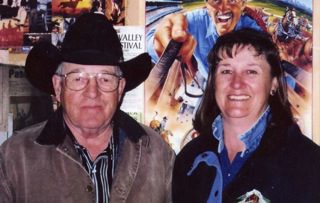
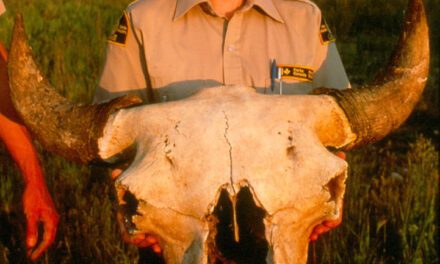
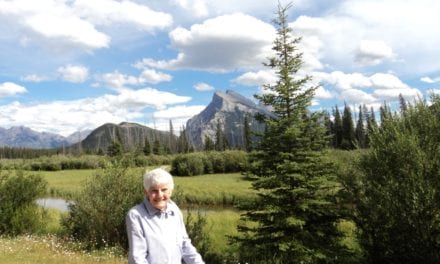
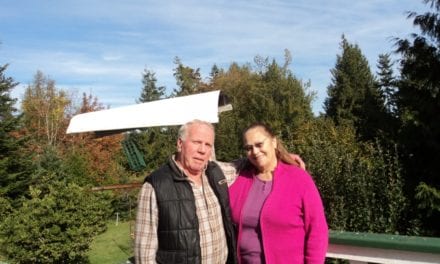
This was a great read, glad I had the pleasure of working with Hal in Cape Breton Highlands National Park . Janice used to make us a wicked cup of “stake out “ coffee to take out on night time poaching patrols.